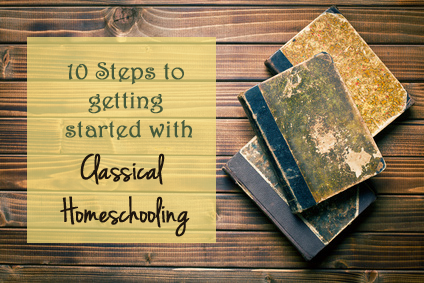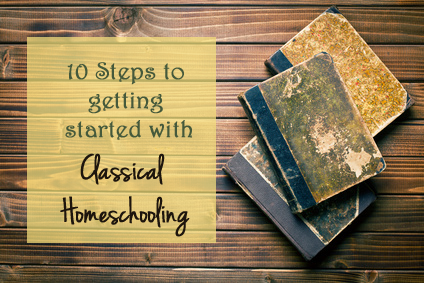Whether you heard a talk at a convention, went to a classical co-op informational meeting, or you read something online you find yourself drawn to Christian classical homeschooling. Each of us has come to learn about this way of homeschooling in a variety of ways. If you haven’t read it already, you can read my story here.
If you are not sure what Christian classical education is, I recommend visiting the Circe Institute online. They have great descriptions and a wealth of other resources related to classical education. Also, Charlotte Mason’s Original Homeschooling Series is one of the best embodiments of Christian classical education we have available to us today. Definitely, check out both of those resources.
For those who have read about Classical/Charlotte Mason education, you have probably noticed a lot of big ideas, some new words, and a bounty of beautiful ideals. This is expressed beautifully in my favorite definition of classical education.
“Classical Education is not, preeminently, of a specific time or place. It stands instead for a spirit of inquiry and a form of instruction concerned with the development of style through language and of conscience through myth.” -David Hicks, Norms and Nobility: A Treatise on Education
, page 18
We are going to unpack this definition along with some other ideas over the next two weeks, because in them it contains what I believe is a wonderful prescription for getting started with classical homeschooling. Sometimes, all this can seem to be a harder philosophy to implement in real learning environments. At least for me, I felt this way at first because this way of educating was super foreign to me. It takes time to transition from a modern traditional educational paradigm to a more natural and classical educational paradigm and that is okay. We are all in process. Over the last five years I have had a chance to learn and reflect on what works, what does not, and what I wish I would have known in the beginning. I made a list of 10 things that are vital to begin if you want to homeschool classically. The last three are not as vital, but necessary to make the logistics work. An important thing to remember about this list is that it is a starting point. It is a great place to start, but I don’t think we ever graduate from learning more about these things, especially numbers one – seven. So here they are:
10 steps to Getting Started with Christian Classical Homeschooling
3. Embrace a Spirit of Inquiry
5. Begin learning how to teach mimetically
6. Begin learning how to teach socratically
7. Commit to developing style & conscience
8. Put your supports in place: Curriculum & Community
9. Give your students passports to our world: Record Keeping, Assessment, and a Helpful Checklist
10. Decide to get things done: Scheduling & Planning
I will be going a bit deeper with each step over the course of the next 9 days. Today we will dive deeper into step 1: Ask questions.
I have heard it said that the quality of your life is determined by the quality of your questions. I believe this is true. As I look back on my life, the most important paradigm shifts I have encountered started with a question. Sometimes I don’t figure out the answer to something because I do not know what questions to ask. Questions are powerful. That is why the first step is to ‘Ask Questions.’ When I first decided to homeschool, a very kind lady at my church invited me over. She gave me an assignment to write out all the reasons why I wanted to homeschool. I am so glad she had me do this. It clarified so much for me and started me out on the right path. This question of why is huge and we will spend all of tomorrow’s post talking more about it.
As I continued in my homeschooling journey, I encountered more questions like: “What do I want my children to walk away with when they are done at my homeschool?”; “What is education?”; “How do I teach this?”; “How do my children learn?”; “Is there a Christian way to educate?” “Is it different that the modern approach to education?”; “How do I know when I am doing enough?”; “What if I mess my kids up?”; “What is virtue and can it be taught?” and “What does ‘the way we are’ say about how we should be taught and what we ought to be learning?”
Each of these questions forced me to dig deeper, understand more, and pushed me to become a better teacher and mom. Many of these questions I am still asking and learning from. Now, it’s your turn. The first question I want you to ask is “Why?” “Why do you homeschool or want to homeschool?” Second, I want you to list out everything you want to cultivate in your children by the time they graduate. Take your time, get up early while it is quiet if you have to. It will be worth it. When you are done, bring your list and come read tomorrow’s post about Starting with Why. If you would like to share some of your answers I would love to hear them.
P.S. Just for fun, I found my very first list from 2009 when I was first beginning this classical homeschooling thing. I thought it would be fun to redo my list now to see what has changed. Here are my lists:
Return to the Getting Started with Classical Homeschooling series


Great post! I look forward to hearing more from you. I saw Andrew Kern (CiRCE) speak a couple of months ago (along with a few other big classical names) and it put a whole new meaning to classical education. I love learning more and more as I go!
Thank you Amy. I feel the same way both about classical education and learning more! 🙂
Great list! We’re classical homeschoolers too so it’s always nice to “meet” a like-minded homeschooler!
I make a list of goals every school year (fairly practical goals) and I enjoy looking back at previous years. It’s so nice to see the progress we’ve made.
Thank you! It is great to “meet” you as well. I agree, sometimes I can feel like I have made as much progress as we really have. Thank you for your comment! 🙂
Thx for this post, Jennifer! I enjoyed reading it! I have been making lists of why I want to homeschool to make sure I want to do it for the right reasons. This post was very encouraging! Thank you!
I am so glad! Thank you for reading!
Things I Want My Children To Possess When They Leave my Homeschool:
1. A Sense of Wonder
2. An Unquenchable Thirst for Truth, Goodness and Beauty
3. Sensitivity to the Holy Spirit
4. The Ability to Counteract Hubris
5. An Understanding of Schole
6. A Humble Understanding of all that They Do Not Yet Know
7. A Reputation of and Desire to Love Much and Well
8. A Desire to Behold the Lamb
9. Awe of the Creator and All Created Things
10. A Love of Language and the Ability to Use It Effectively
11. A Habit of Slow, Careful, Wide Reading.
12. Ownership of and Accountability for Their Own Faith and Relationships With Christ
13. Memories of Laughter and Peace
14. The Ability to Laugh at Themselves, Give Themselves Much Grace, and Challenge Themselves
15. An Understanding of Habitual Repentance and Surrender to Sanctification
16. A List of Great, Good, and Lovely Book Read and To Read
17. An Identity Anchored in Christ Alone
18. A Respect for and Ability to Care for Their Whole Selves: Body, Mind, and Soul
19. The Ability to Order Their Affections Through Liturgy and Habit
20. Respect, Empathy, and Compassion for All Persons
Crystin,
Thank you for sharing. This is beautiful.
Thank you, Jennifer, for inspiring this post, and for profoundly challenging and inspiring me. As I posted a comment to respond to your question and share my answers, I had no idea how much it would impact me. Thank you, thank you!
http://www.delightfullyfeasting.com/2017/10/possessions-i-desire-value-and-cultivate.html
Oh wow. Thank you so much for saying so. It is my pleasure! And thank you for sharing it over on your space. I am going to check it out now.
I am off of the proverbial deep end in the beauty that is your website, and I have a feeling I’ll be linking to here on my own site many more times. So many great articles! My common place now has “Jennifer Dow” attributed to pages and pages of notes.
Oh! That makes me smile! Thank you for sharing. I am glad you are enjoying the blog.